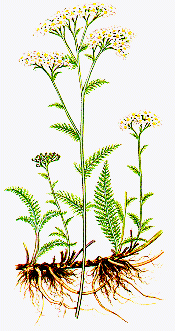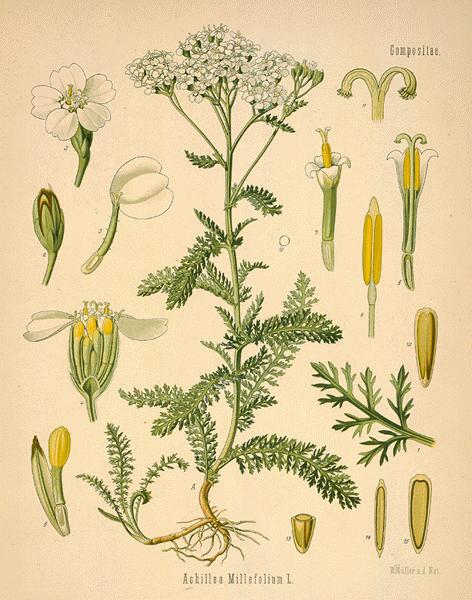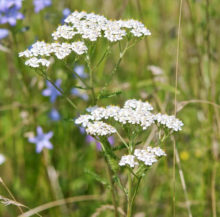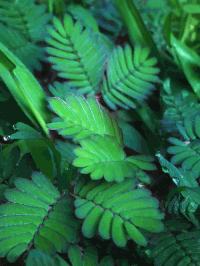Yarrow
- Scientific Name: Achillea millefolium
- Plant Family: Compositae
- Parts Used: The whole plant – stems, leaves, flowers, collected in the wild state, in August, when in flower.
- Actions: Diaphoretic, Hypotensive, Astringent, Diuretic, Antiseptic, Anticatarrhal, Emmenagogue, Hepatic, Stimulant, Tonic, Mild Aromatic
The Basics:
Yarrow is a wound herb, astringent and healing, and rich in vitamins and minerals. Bind bruised fresh leaves to cuts, or make an ointment by pounding the flowers and mixing with coconut oil, or bathe wounds with yarrow tea. The tea is also a good tonic drink, it restores lost appetite and promotes perspiration during colds and fevers. Chew fresh leaves to soothe toothache.
Yarrow also lowers blood pressure due to a dilation of the peripheral vessels. It stimulates the digestion and tones the blood vessels. As a urinary antiseptic it is indicated in infections such as cystitis. It is considered to be a specific in thrombotic conditions associated with high blood pressure.
The flowers are often steamed and inhaled to treat hay fever and asthma and in teas for respiratory problems, as a wash for eczema and other skin conditions; and in chest rubs for cold, flu, and inflamed joints.
Yarrow grows everywhere, in the grass, in meadows, in pastures, and by the roadside. As it creeps gently by its roots, and multiplies by seeds, it becomes a troublesome weed in gardens.
Preparation and Dosage:
Tea: Pour a cup of boiling water onto 1 – 2 teaspoonfuls of the dried herb and leave to infuse for 10 to 15 minutes. This should be drunk hot three times a day. And can also be used to bathe a wound. When feverish, it should be drunk hourly.
Ointment: Pound a generous handful of the flowers into a pulp and mix with enough slightly warmed coconut oil to make a nice thick paste. The ratio of flowers to oil that I like is approximately 4 to 1, experiment until you have a ratio that works for you.
Tincture: Take 2 to 4 ml of the tincture three times a day.
Combinations:
For fevers – it will combine well with Elder Flower, Peppermint, Boneset, Cayenne, and Ginger
For raised blood pressure – it may be used with Hawthorn, Lime Blossom, and Mistletoe
Historically:
 Yarrow has always been regarded as a plant of great power, both as a protection against evil and to invoke black magic. It was used as an herb of divination by the early Chinese – whose ancient book, the I Ching, is also known as the Yarrow Stalk Oracle – and by the Druids and Anglosaxons.
Yarrow has always been regarded as a plant of great power, both as a protection against evil and to invoke black magic. It was used as an herb of divination by the early Chinese – whose ancient book, the I Ching, is also known as the Yarrow Stalk Oracle – and by the Druids and Anglosaxons.
Yarrow was much esteemed as a medicine used in the healing of wounds, and it’s old names of Soldier’s Wound Wort and Knight’s Milfoil testify to this. The highlanders made an ointment from it, which they applied to wounds, and Milfoil tea was held in much repute in the Orkneys for dispelling melancholy. It is the same plant with which Achilles staunched the bleeding wounds of his soldiers. It was called by the Ancients, the Herba Militaris, the military herb.
In the nineteenth century, Yarrow was said to have a greater number of indications than any other herb.
Some people chew the fresh leaves to relieve toothache. Yarrow can be applied to the skin to stop bleeding from hemorrhoids and as a sitz bath for painful, lower pelvic, cramp-like conditions in women. In combination with other herbs, yarrow is used for bloating, intestinal gas (flatulence), mild gastrointestinal (GI) cramping, and other GI complaints.
Folk Names:
- Bad Man’s Plaything – for it’s association with magick and diviation
- Bloodwort – for it’s blood staunching ability
- Devil’s Nettle – for it’s association with magic and the occult
- Devil’s Plaything – for it’s association with the occult
- Field Hop – because it was used in place of hops in the manufacture of beer
- Herbe Militaria – because of it’s use on the battlefield
- Knight’s Milfoil – because of it’s use on the battlefield
- Little Feather – for the shape of the leaves
- Nosebleed – for it’s blood staunching ability
- Old Man’s Pepper – often used as snuff because it was believed to “cleanse the head of tough slimy humours”
- Plumajillo – for the shape of the leaves
- Sanguinary – for it’s blood staunching ability
- Soldier’s Wound Wort – because of it’s use on the battlefield
- Staunchweed – for it’s blood staunching ability
- Thousand Weed – due to it’s ability to grow, spread, and thrive
- Yarroway – local vernacular
Other uses:
The young leaves have a pleasant, fresh taste, but become peppery with age. Chop them in salads or boil like spinach.
In the garden:
Yarrow can be grown easily from seed or root. When grown in the garden, yarrow is said to increase the health of nearby plants. As a compost activator, it encourages fermentation, and a strong infusion can be used as a fertilizer that is especially useful for soil deficient in copper.
Special Precautions & Warnings:
- Pregnancy and breast-feeding:
Yarrow is LIKELY UNSAFE when taken by mouth during pregnancy as it can affect the menstrual cycle and might cause miscarriage. There is not enough reliable information about the safety of taking yarrow if you are breast-feeding. Stay on the safe side and avoid use. - Bleeding disorder:
Yarrow might slow blood clotting when taken by mouth. In theory, taking yarrow might increase the risk of bleeding in people with bleeding disorders. - Allergy to ragweed and related plants:
Yarrow may cause an allergic reaction in people who are sensitive to the Asteraceae/Compositae family. Members of this family include ragweed, chrysanthemums, marigolds, daisies, and many others. If you have allergies, be sure to check with your healthcare provider before taking yarrow. - Surgery:
Yarrow taken by mouth might slow blood clotting so there is a concern that it might increase bleeding during and after surgery. Stop taking yarrow at least 2 weeks before a scheduled surgery.
Drug Interactions:
- Lithium:
Yarrow might have an effect like a water pill or “diuretic.” Taking yarrow might decrease how well the body gets rid of lithium. This could increase how much lithium is in the body and result in serious side effects. Talk with your healthcare provider before using this product if you are taking lithium. Your lithium dose might need to be changed. - Sedative medications (Barbiturates):
Yarrow might cause sleepiness and drowsiness. Medications that cause sleepiness are called sedatives. Taking yarrow along with sedative medications might cause too much sleepiness.
Recipes and Formulas:
- Recipes and formulas that use Yarrow can be found at: Folk Medicine Remedies and Cures
- Divinations using Yarrow can be found at: Divination
- Magickal formulas and blends that use Yarrow can be found at: Magickal Apothecary
Note: This post was compiled from a variety of sources by shirleytwofeathers specifically for the Encyclopedia of Herbology. Do not copy or repost without credit and a link back to this website.
Rennie Luttrull: queen-annes-lace-seeds
Rosanna: Spignel aka Bald Money
Annamarie Squatrito: Fumitory
EILEEN Klinghagen: Pumpkin
Mahmudul Hasan: Celery




Leave a Reply